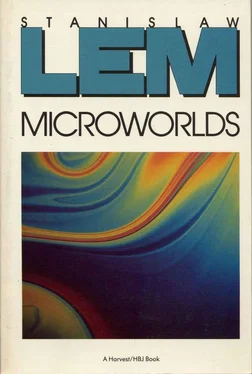Translated by Richard Howard (Cleveland/London: The Press of Case Western Reserve University, 1973) from Introduction à la littérature fantastique (Editions du Seuil, 1970). All quotations from Todorov are from the pages of this translation. — R. D. Mullen.
The difference is that Zeno’s paradoxes confront the trivial interpretation of physical processes with the contradictory results of their purely logical interpretation, whereas the paradoxes of Borges are directed toward the universe of cultural facts.
Strictly speaking, what has been said isn’t true insofar as there are no systems of belief (of either an orthodox or a heterodox nature) that would not hide contradictions within their structures. For them, the supreme court of decision is revelation, not logical reasoning. For instance, consider the fact that it is possible to postulate a logically impossible trinity, but not the existence and nonexistence of a God at the same time — although in both cases logic is similarly suspended. The “strictly logical” heresy in the Judas story means that his postulated “role as savior” is proved by the same logical means that belong to the arsenal of the traditional demonstrators of Christian theology. The heterodoxy arises only because Borges does not halt where, according to the Scriptures, any orthodox theological attempt at interpretation must “desist unconditionally.” Borges’s conclusions lead to a point which transcends the permissible boundaries, but this does not destroy logic, for this boundary is of an extralogical nature.
If Schopenhauer had never existed, and if Borges presented to us the ontological doctrine of “The World as Will,” we would never accept it as a philosophical system that must be taken seriously; we would take it as an example of a “fantastic philosophy.” As soon as nobody assents to it, a philosophy becomes automatically fantastic literature.
This can be seen from the fact that several times he has rewritten material supplied by others. I have not discussed this aspect of his work, for I believe that nothing can be more erroneous in criticism than to descend to the shallow passages of the work of a writer merely in order to prove their worthlessness. Besides, it is an undisputed fact that world literature is full of prose that is similar, and the immense number of such exercises alone deprives of originality any piece that can defend its individuality only by stylistic means. You can see this in the stories comprising the last two parts of the Hanser volume [which Lem was reviewing in this essay —TRANS.], especially in regard to the stylistic means employed, whose baroque character is stressed by Borges in his introduction. The more nearly a work becomes “literature,” the greater its originality (as measured by the integral of its differences from all other literary works), the more this kind of fiction, which only increases the number of already existing texts by further similar elements, must be likened to the enlargement of an ocean by the pouring of water into it — it is, rather, a work of reproduction, more related to the crafts than to creative art. Of course, ninety-five percent of all writers are just craftsmen; but the historical movement of literature, and its historical changes, are caused by the inventors, heretics, visionaries, anticonformists — the revolutionaries of writing. And this gives us the right to measure any work claiming to belong to the top in literature first of all by its originality. Many writers can entertain; but only a few can amaze, educate, and move. But because such a point of view is open to attack, I have armed this review with a warning against its subjective character. Also I do not intend to evaluate the whole work of Borges, and especially not his poetry, which I would feel I would have to read in its original Spanish form. Whatever the matter may be with his poetry (which I value highly), it does not belong to fantastic literature for the simple reason that, in my opinion (and here I am in agreement with T. Todorov), on principle there can be no fantastic poetry.
The foregoing essay, subscribed “July 1975” in the Polish original, has been translated from the text that appeared as the Afterword to Arkady and Boris Strugatsky’s Picknick am Wegesrand (Frankfurt: Suhrkamp, 1981), pp. 189-215. The essay first came out as an afterword to the Polish translation of the Strugatskys” Piknik na obocine: Piknik na skraju drogi (Kraków: Wydawnictwo Literackie, 1977), pp. 265-88. For this last bit of information, and for his generous assistance in checking our rendering of Lem, we are indebted to Dr. Franz Rottensteiner, who, however, is not to be held accountable for our errors. We are equally grateful to Elizabeth Kwasniewski for her help and patience in correcting the English translation against the original Polish. — Robert M. Philmus.
Parenthetical references (which the translators have supplied) are to Roadside Picnic, trans. Antonina W. Bouis (New York: Macmillan, 1977). This volume also includes Tale of the Troika. — Robert M. Philmus.
Our entire explanation, which provides a new interpretation of the riddle presented by the landing in Roadside Picnic, may seem to be an aberration brought on by excessive pedantry, all the more so since, after all, we are not analyzing a real event, but a literary fiction. But truly scientific fantasy is distinguished by just this: that one can subject the events described in it and their rational depiction to the same proof of coherence as phenomena that occur in the extraliterary world. Such a work may start with a fictive, even an extremely fictive, premise. Yet this authorizes only an initial poetic license, which loses its validity within the story itself. This means that the storyteller may not, within the story, continue to help himself along by the ad hoc invention of whatever things or phenomena strike his fancy. Fairy tales may operate with such ad hoc inventions; for they are not at all required to explain logically or empirically the miraculous occurrences they depict. A science-fiction story that makes this fairy-tale license its own leaves the realm of the real world and puts itself in the position of the fairy tale, in which everything that is thought of or said for that very reason instantly becomes possible and must be unquestioningly accepted as true coin by the reader. In short, though the facts in a science-fiction story may be fictive, the way in which science in the fiction interprets these facts may not. Scientific theories change; but what does not change is the method of discovery that characterizes science, and it is precisely this methodology that dictates a certain type of hypothesis-formation in science fiction. Accordingly, our polemic, as an example of how criticism of science fiction should typically proceed, can be applied mutatis mutandis to every work that fulfills the main criteria of this genre.
We are presenting the hypothesis of the calamity in its simplest, which does not mean its most probable, version. For example, an unmanned spaceship with containers might have been sent forth without any fixed addressee in mind; it might have been outfitted with sensors that would recognize the planet to be “gifted” by virtue of predetermined parameters (such as its average temperature; its atmospheric composition, particularly the presence of free oxygen and water; an orbit favorable to ecological development; etc.). Such an automatically piloted vehicle could have approached various stars on a scouting mission. However, because it is physically impossible to manufacture technological products to survive undamaged over a journey of indeterminate length (which may take millions of earth-years), such a vehicle must have been provided with a device that would automatically destroy the contents when their “shelf life” had ended. Such a vehicle could have entered our solar system as the “shelf life” of the articles was nearing the expiry date. After all, it could also have been that the self-destruction did not occur only because the ship’s surveillance system discovered earth and dispersed the containers with their “partially spoiled” contents. The degree of damage to individual surveillance, steering, and control systems is uncertain; only the statistical probability of damage can be determined — i.e., the one thing absolutely certain is that the probability of defects occurring in the programs and their execution system increases with the passage of time. I should emphasize this point: the more complicated a device, the more inevitable are breakdowns over the course of time; this is a universal law that is independent of where in the cosmos the technology was produced or how. Therefore, the enterprise of learning about the aliens — what the Strugatskys call “xenology” — must take the statistical-probability aspect of intercivilizational contact into account as something crucial for interpreting such visits.
Читать дальше












